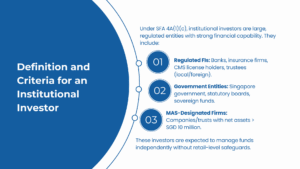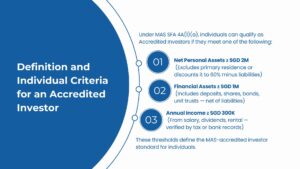Criteria for Accredited and Institutional Investors
The integrity of the capital markets in Singapore and protection for its investors are both guaranteed by MAS in the financial industry. Being part of its regulatory system, MAS sorts investors into different groups according to their experience in finance and their finances. This classification aligns with MAS financial reporting requirements for investors, which ensures transparency and accountability. Two main kinds of investors there are “Accredited Investors” and “Institutional Investors.”
This article explains what makes someone an accredited or institutional investor, why the categories exist and the consequences for both fund managers and investors.
Why Investor Classification Matters for Accredited and Institutional Investors
The type of investor tells a bank what level of supervision to follow which products to provide them and how much research is needed before providing services. Due to their raised financial expertise, accredited investors receive less protection from regulations than retail investors do.
Part of a fund management company’s job is to classify its clients correctly because their license determines who they can serve.
Definition and Criteria for an Institutional Investor
The Securities and Futures Act (SFA) Section 4A(1)(c) allows for the definition of institutional investors as being large, regulated and financially capable. Among the institutions who invest are:
1. Regulated Financial Institutions
These include:
- Both local and foreign banks
- Merchant banks
- Finance companies
- Insurance companies
- Those who hold a capital markets services license
- Trustees in Singapore are governed by the MAS.
- Subject to equivalency with the regulations, you may use the overseas equivalents (described above).
2. Government and Statutory Bodies
Entities include:
- Singapore’s government
- Any statutory board formed by an Act in Singapore
- These countries use sovereign wealth funds and their central banks.
3. Other Institutions Prescribed by MAS
Among them are companies that are subject to specific asset size or who MAS has designated through regulations. For example:
- A company whose net assets are over SGD 10 million (the equivalent in foreign funds)
- If your total assets in the trust or partnership go past SGD 10 million
Such organizations are expected to possess the necessary investment skills and controls to manage their money on their own, without needing protections offered to typical investors.

Definition and Individual Criteria for an Accredited Investor
Accredited Investors are individuals or businesses that meet certain financial, asset or income criteria, even though they are not subject to regulation. This aligns with the definition of accredited investor under MAS.
According to section 4A(1)(a) of the SFA and the Securities and Futures (Classes of Investors) Regulations, MAS offers three ways for someone to be an accredited investor.
1. Net Personal Assets of SGD 2 Million
The overall value of assets owned by a person, aside from their primary residence (which are usually discounted) must reach SGD 2 million.
- When the primary residence is considered, the government will use only 60% of the property’s market value, minus any liens.
- All assets should be reported after subtracting liabilities.
2. Financial Assets of SGD 1 Million
An individual needs to hold financial assets (after deducting liabilities) that exceed SGD 1 million. Part of financial assets might be:
- Bank deposits
- Examples of investment products are bonds, shares and unit trusts
- Cash equivalents
You should know that only financial assets and not physical ones, are part of this definition.
3. Income of SGD 300,000 per Annum
Applicants should have received at least SGD 300,000 over the previous 12 months. This can happen by:
- Employment income
- Dividends
- Rental income
All kinds of income need to be checked by showing tax documents or bank records.

Accredited Investor Entity Criteria and Classification Requirements
Entities such as corporations and trusts can also qualify as Accredited Investors if they meet certain thresholds.
1. Corporations with Net Assets Exceeding SGD 10 Million
To qualify, a corporation must have net assets exceeding SGD 10 million as determined by:
- The most recent audited balance sheet
- Or a certified balance sheet by its directors
2. Partnerships with Total Net Assets Exceeding SGD 10 Million
The partnership must provide audited financials or a partner’s declaration confirming this threshold.
3. Trusts Where Each Beneficiary Is an Accredited Investor
Trusts may qualify if:
- All beneficiaries are accredited investors
- The trustee is a licensed trust company or bank
- The trust instrument allows for financial investments
Opt-In and Opt-Out Mechanism for Accredited and Institutional Investor Status
Since 2016, MAS has adopted a formal opt-in and opt-out regime for individual accredited investors to ensure they understand the implications of such status.
Opt-In Process
Fund managers or financial institutions must:
- Provide written disclosure on the consequences of being treated as an AI
- Obtain explicit consent from the investor
- Keep detailed records of the opt-in process
Opt-Out Rights
Investors who previously opted in may revoke their consent at any time and request to be treated as retail investors again. This gives investors flexibility in managing the level of protection they desire.
Documentation and Verification Requirements for Accredited and Institutional Investors
Fund management companies and financial institutions are required to verify an investor’s AI or II status before onboarding them. Common verification methods include:
- Audited financial statements
- Tax return documents
- Official bank or brokerage account statements
- Property valuation reports (when primary residence is used in calculation)
Failure to verify and document investor classification may lead to regulatory violations, enforcement action, and reputational risks.
Implications of Accredited and Institutional Investor Status on Investment Access and Risk
Being categorized as an Accredited or Institutional Investor has several implications:
1. Access to a Wider Range of Products
These investors can access:
- Complex investment products
- Private placements
- Hedge funds and venture capital funds
- Non-retail structured products
2. Reduced Regulatory Safeguards
AIs and IIs receive:
- Limited disclosures
- Fewer suitability assessments
- Less stringent product governance controls
This is based on the assumption that such investors can make informed investment decisions.
3. Eligibility for Non-Retail Fund Managers
Fund managers holding RFMC, A/I LFMC, or VCFM licenses are only permitted to serve accredited and institutional investors. This status is essential for onboarding with such FMCs.
Common Misunderstandings About Accredited and Institutional Investor Criteria
Despite clear guidelines, there are common misconceptions about the classification process:
Misconception 1: “Having a high income alone qualifies me as an accredited investor.”
Clarification: Income is just one of three criteria. An individual must meet at least one and provide supporting evidence.
Misconception 2: “Once classified as an AI, I cannot change my status.”
Clarification: Under MAS rules, investors have the right to opt out at any time and request to be treated as a retail investor.
Misconception 3: “All companies are institutional investors.”
Clarification: Only certain entities—such as licensed financial institutions, statutory boards, and large corporations with qualifying net assets—are classified as institutional investors.
Conclusion
Understanding the criteria for determining whether an investor is an accredited or institutional investor is critical in Singapore’s regulatory framework. Accurate classification ensures appropriate risk disclosures, compliance with MAS licensing restrictions, and investor protection.
Key Takeaways:
- Institutional investors are typically large, regulated entities like banks, insurers, and government bodies.
- Accredited investors can be individuals or entities that meet specific financial thresholds.
- There are clear, documented procedures for opting in and out of accredited investor status.
- Fund managers and financial institutions must maintain evidence and adhere strictly to MAS guidelines when classifying clients.
By ensuring that investor classifications are accurate and compliant, fund management companies can uphold regulatory standards while providing sophisticated investment opportunities to eligible clients.




